网瘾网络游戏成瘾外文翻译文献
网瘾网络游戏成瘾外文翻译文献

网瘾网络游戏成瘾外文翻译文献文献信息:文献标题:Risk factors associated with online game addiction: A hierarchical model(与网络游戏成瘾相关的风险因素:层次模型)国外作者:Hyun, Gi Jung, et al文献出处:《Computers in human behavior》,2015,48:706-713.字数统计:英文2884单词,16605字符;中文5177汉字外文文献:Risk factors associated with online game addiction:A hierarchical modelAbstract Online gaming addiction has been increasingly recognized as a mental disorder. However, the predictive factors that lead to online gaming addiction are not well established. The aim of this study was to identify factors that may infiuence the development of online gaming addiction. A total of 263 patients with problematic online gaming addiction (255 males (97%) and 8 fema les (3%), age: mean = 20.4 ±5.8 years)and153 healthy comparison subjects (118 males (77%) and 35 females (23%), age: 21.2 ±5.5 years, range) were recruited for participation in the current study. Hierarchical logistic regression analyses among each set of variables were conducted. Individual factors (sex and age), cognitive factors (IQ and perseverative errors), psychopathological conditions (ADHD, depression, anxiety, and impulsivity), and social interaction factors (family environment, social anxiety, and self-esteem) were evaluated in a stepwise fashion. All four factors were associated with online gaming addiction, with psychopathological conditions being the strongest risk factors for the addiction. Individual factors,psychological factors, and social interactions were associated with the development of pure online gaming addiction. As before, psychological factors (attention, mood, anxiety and impulsivity) were the strongest risk factors for online gaming addiction in patients with pure online gaming addiction.Psychopathologies, including ADHD and depression, were the strongest factors associated with the development of online gaming addiction inindividuals.Key words: Online gaming addiction; Social interaction; Psychopathology Individual factors; Cognitive functions1.IntroductionRecently, it has been suggested that internet addiction is a mental health problem (Lam, Peng, Mai, & Jing, 2009). Internet addiction may impair daily life, academic performance, family relationships, and emotional development, particularly among adolescents. Since 1996, w hen the concept of ‘‘internet addiction’’ was introduced as a new clinical disorder, internet addiction has been studied in terms of the physical and psychological consequences, particularly in China, Korea. However, the causes or aggravating factors that lead to internet addiction remain unknown, although many studies have attempted to explore its causes in terms of demographic factors, psychopathological conditions, psychosocial and family environment, and cognitive functions (Aboujaoude, Koran, Gamel, Large, & Serpe, 2006; Ha et al., 2006; Park et al., 2011; Tsai et al., 2009; Wang & Wang, 2013).In general, individual factors related to online gaming addiction such as sex and age have been considered in previous studies. Most studies report that the male sex conveys a 2–3 times higher risk for internet addiction than the female sex (Lee,Han, Kim, & Renshaw, 2013; Sasmaz et al., 2014). In addition, older age has been reported to be a risk factor for internet addiction among adolescents (Ahmadi & Saghafi, 2013).In terms of causal cognitive factors for online gaming addiction, IQ and cognitive fiexibility have been considered. A study by Park et al. (2011) noted that adolescents with internet addiction have lower comprehensive sub-item scores on the Wechsler Adult Intelligence Scale (WAIS-R) in comparison to healthy control subjects. A study by Zhou, Yuan, and Yao (2012) indicatedthat patients with online gaming addiction demonstrate low mental fiexibility and response inhibition in modified versions of go/nogo tests. In our previous study, patients with online gamingaddiction showed increased numbers of perseverative responses and perseverative errors on the Wisconsin Card Sorting Test (Han, Lyoo, & Renshaw, 2012).Psychopathological conditions that are often co-morbid with onlinegamingaddiction,attentiondeficitandhyperactivity disorder (ADHD), major depressive disorder (MDD), anxiety, and impulsivity have been considered. Several previous studies of internet addiction have noted that some symptoms in patients with problematic internet use are the same as those observed in other psychopathologies (Aboujaoude et al., 2006). For example, ADHD and MDD are the most frequent comorbid disorders in a South Korean sample population, and the clinical characteristics of internet addiction are similar to clinical symptoms in patients with ADHD or MDD (Ha et al., 2006; Park, Lee, Kim, Jeong, & Han, 2013; Yoo et al., 2004). In a survey of 987 Indian adolescents (Goel, Subramanyam, & Kamath, 2013), adolescents with higher internet addiction score also show higher scores on anxiety anddepression scales. The association between violent games and aggressive behavior is controversial. Past study suggested the correlation between violent video game and aggressive behavior in healthy subjects (Anderson & Dill, 2000). However, a recent time series analysis and meta-analysis have shown that violent films are negatively correlated with aggressive behaviors (Markey, French, & Markey, in press), and there is no evidence that violent video games increase aggression in children (Ferguson, in press).In terms of social interaction factors that have been related to online gaming addiction, family environment, social anxiety, and self-esteem have been considered. Based on an online survey of 1642 people (19–60 years of age), Wang and Wang (2013) reported that excessive internet use is motivated by cyberspace social encounters in individuals with poor offiine social support, including support from family members. However, based on a survey of 2348 college students, Yen et al. (2012) suggested that the internet is a good alternative outlet for individuals with social anxiety. In contrast, Lee and Stapinski (2012) reported that online communication exacerbates face-to-face avoidance in individuals with higher levels of perceived social anxiety.Self-esteem is thought to mediate social interactions and preference for online social interactions (Caplan, 2005; Fioravanti, Dettore, & Casale, 2012; Stinson et al., 2008). Bozoglan, Demirer, and Sahin (2013) found that low self-esteem was associated with internet addiction in a sample of Turkish university students 18–24 years of age. A study by Lemenager et al. (2013) reported selfconfidence deficits in individuals characterized as major users of multiplayer online role-playing games.Each of these studies, however, focused on only one or twoindependent factors, without considering the hierarchical importance among variable risk factors. As observed in other addiction disorders as well as in child and adolescent disorders (Lee et al., 2013), identifying the hierarchical importance of risk factors for online gaming addiction may infiuence policy and treatment. Based on patients with online gaming addiction consecutively referred to the Online Game Clinic Center at OO University Hospital, we aimed to assess the hierarchical importance among individual factors, cognitive functions, psychopathological conditions, and levels of psychosocial and family support in patients with online gaming addiction.2.MethodThe current study screened 308 patients with problematic online gaming habits (296 males (96%) and 12 females (4%), age: mean = 21.0 ±5.9 years, range: 12–45 years) who visited the Online Game Clinic Center at OO University Hospital from June 2011 to March 2013. Through advertisements posted at OO University and OO University Medical Center, 153 healthy comparison subjects (118 males (77%) and 35 females (23%), age: 21.2 ± 5.5 years, range: 13–40 years) were recruited to voluntarily participate in the study. Both the patients and the control subjects were screened with the Structured Clinical Interview for DSM-IV (Ha et al., 2006; Kusumakar, MacMaster, Gates, Sparkes, & Khan, 2001), and patients were secondarily diagnosed with comorbidities by two child and adolescent psychiatrists. All subjects were asked to complete questionnaires regarding the severity of internet addiction, individual factors, family environment, social interactions, and comorbidities.The criteria for online game addiction in the current study were similar to those employed in other previous studies (Han,Hwang, & Renshaw, 2010; Ko et al., 2009). Factors associated with addiction included: (1) online game playing through the internet, more than 4 h per day or 30 h per week, (2) Internet Addiction Scale score >50 (Young, 1996), (3) irritable, anxious, and aggressive behaviors when compelled to stop online game playing, (4) impaired behaviors or distress, economic problems, or maladaptive patterns of regular life due to excessive online game play, and (5) irregular life patterns due to disrupted diurnal rhythms (e.g., sleeping during the day and gaming at night, irregular meals, and failure to maintain personal hygiene), school truancy, or loss of job.Exclusion criteria included: (1) a history or current episode of other Axis I psychiatric diseases, with the exception of MDD and ADHD, (2) IQ < 80, (3) substance abuse history, with the exception of alcohol or tobacco abuse, and (4) neurological or medical disorder. Ultimately, 263 patients with online gaming addiction (255 males (97%) and 8 females (3%), age: mean = 20.4 ±5.8 years, range: 12–45 years), consisting of 109 with only online gaming addiction (referred to herein as pure online gaming addiction), 92 with online gaming addiction and ADHD, and 62 with online gaming addiction and MDD, were included in the study. The patients excluded were 14 patients with multiple diagnoses of online gaming addiction plus ADHD and major depression, 11 patients with schizophrenia, 5 patients with obsessive–compulsive disorder, 4 patients with alcohol dependence, 7 patients with autism spectrum disorders, and 4 patients with mental retardation. The research protocol for the current study was approved by the OO University Hospital Institutional Review Board. Written informed consent was provided by patients older than 18 years. In adolescents youngerthan 18 years, written informed consent was provided by parents and adolescents.3.DiscussionOf the four risk categories including individual factors, cognitive functions, psychopathologies, and social interactions, psychopathologies were the strongest riskfactors for online gaming addiction in all patients. Specifically, sex, self-esteem, attention, depressive moods, family environment, and perseverative errors were significantly associated with online gaming addiction. In patients with pure online gaming addiction, associations were found with individual factors, psychological factors, and social interactions. Of the four categories, psychopathologies were the strongest risk factors for online gaming addiction in patients with pure online gaming addiction. Specifically, sex, age, self-esteem, attention, depressive moods, and family environment were significantly associated with online gaming addiction in these patients.3.1.Individual factorsOf the two individual factors, sex was a risk factor for online gaming addiction in all patients. Both sex and age were also associated with online gaming addiction in patients with pure online gaming addiction.Sex differences may be due to different online use between males and females. Female adolescents typically use online networking for enhancing communication and sharing information via instant messaging, chatting, and visiting personal websites. However, male adolescents mainly use online networking for playing online games (Gross, 2004). In addition, temperamental characteristics, including higher levels of novelty seeking, higher comorbidity of ADHD, and higher levels ofimpulsivity in males are responsible for higher rates of online gaming addiction relative to females (Bozkurt, Coskun, Ayaydin, Adak, & Zoroglu, 2013; Dalbudak et al., 2013; Ko et al., 2010; Wu et al., 2013). A study by Park et al. (2013) reports that increased age is a risk factor for online gaming addiction in adolescent patients.3.2.Cognitive factorsAlthough there are controversies in terms of the relation between cognitive function and internet addiction, the results of the current study suggest that perseverative errors but not IQ are associated with online gaming addiction. Disrupted perseverative responses have been reported in patients with internet addiction (Han, Kim, Lee, & Renshaw, 2012; Han, Lyoo et al., 2012; Zhou et al., 2012). Relative to healthy comparison subjects, patients with online gaming addiction tend to show increased numbers of perseverative errors (Kusumakar et al., 2001). Poor executive functioning, including low mental fiexibility and response inhibition in patients with online gaming addiction, are thought to be associated with the severity of the addiction (Lemenager et al., 2013). A study by Park et al. (2011) reported that lower comprehensive sub-item scores of WAIS-R were associated with internet addiction. The results of the current study, however, did not show any correlation between IQ and online gaming addiction. The difference between the findings of Park et al. and the current research may be due to the number of subjects, the consideration of comorbidities, or the interactions between other risk factors.3.3.Psychopathological factorsPsychopathologies, especially ADHD and MDD, were the strongest risk factors for online gaming addiction in the currentstudy. In a systematic review of 20 articles about comorbid psychopathologies and pathological internet use, Carli et al. (2013) reported that 100% of articles claim that pathological internet use is associated with symptoms of ADHD, and 75% of the articles assert that pathological internet use is associated with MDD. According to a survey of 2793 college students, adult ADHD is also associated with internet addiction (Yen, Yen, Chen, Tang, & Ko, 2009). The strong association between pathological internet use and ADHD may be related to the characteristics of ADHD, insofar as both sets of patients tend to be easily bored and thrive on instant gratification (Campbell & von Stauffenberg, 2009; Carli et al., 2013). Moreover, Fergurson and Ceranoglu suggest that pathologic gaming behavior may be a symptom of underlying ADHD rather than a unique disease (Fergurson and Ceranoglu, 2014). In our group of patients with pure online gaming addiction (i.e., patients without comorbid ADHD or MDD), K-ARS scores and K-BDI scores were also associated with online gaming addiction. In German game players, emotionally sensitive users play online games more for the purpose of interaction with friends, compared to less sensitive users (Kowert et al., 2014). These results suggest that online gaming addiction may be aggravated by sub-clinical ADHD and MDD. Although there were significant differences between the online gaming addiction group and the healthy comparison group in the present study, the characteristic ofimpulsiveness, as assessed via the BIS/BAS scale, was not associated with online gaming addiction. Many studies suggest that a high level of impulsiveness is associated with internet addiction (Bozkurt et al., 2013; Wu et al., 2013). One group has suggested that internet addiction should be classified as animpulse control disorder (Dell’Osso et al., 2008). The divergent results of the current research from previous research may be due to interaction effects among the K-ARS and K-BDI scores.3.4.Social interaction factorsThe results of the current research show that the factor of family environment within the set of social interaction factors is an important risk factor for an online gaming addiction. Tsai et al. (2009) demonstrated that offiine social support and interaction with family and colleagues in a study of 1360 university freshmen negatively correlated with internet addiction. In a study of family factors contributing to internet addiction, Yen, Yen, Chen, Chen, and Ko (2007) reported that a higher level of confiict between parents and children together with a lower level of family cohesion is a risk factor for internet addiction. A study by Han, Kim et al. (2012), Han, Lyoo et al. (2012) reported that a three-week period of intensive family intervention improved the severity of online game addiction and increased the activity of the caudate nucleus in response to the affect scene. The present study also found that family environment factors were associated with online gaming addiction. Although there were no significant results between social anxiety and online gaming addiction in the present study, social anxiety should be considered to be associated with online gaming addiction. Our result may have been due to the control of psychological factors (BAI score) in the previous analysis steps. A study by Rusconi et al. (2012) reported that increased anxiety due to social interaction is associated with prolonged use of the internet and social network services. A robust level of self-esteem is known to be a protective factor against drug and alcohol addiction, as well as internet addiction. Decreased levels of self-esteem have also been reported to beassociated with internet addiction and online gaming addiction (Bozoglan et al., 2013; Lemenager et al., 2013). Practical support together with positive role models forpatients with drug or alcohol addiction could lead to successful recovery from such an addiction due to increased self-esteem (Johansen, Brendryen, Darnell, & Wennesland, 2013). Future studies should consider additional factors that can affect online gaming addiction including the type of gaming (offiine, computer, console, apps, etc.), game genre, and other addiction comorbidities.4.LimitationsThere are several limitations to the current results. First, although we determined the statistical design in light of previous studies, the arbitrary classification of independent factors and the arbitrary inclusion criteria of ‘online gaming addiction’may reduce the reliability for factors predicting online gaming addiction. In particular, the time spent gaming as an inclusion criterion for online gaming addiction is controversial (Charlton & Danforth, 2007; Skoric, Lay Ching Teo, & Lijie Neo, 2009). Second, the current study did not consider the use of other online facilities such as smart phone services, internet chatting, or smart television. Third, there was a very low percentage of females in the current study; thus, the generalizability of the results to online gaming addiction in females is limited. Third, because game preference and prevalence of ADHD are associated with males, the effect sizes of risk factors other than sex in the regression analysis might have been small. Readers should consider these limitations when interpreting the results.5.ConclusionThe current study assessed the hierarchical importance offour sets of risk factors for online gaming addiction. These factor sets included individual factors, cognitive functions, psychopathologies, and social interactions in patients with online gaming addiction. Psychopathologies including ADHD and depression were the strongest risk factors for the addiction. Control and treatment of ADHD and major depressive disorder may be important for the prevention of online game addiction. Additionally, family environment and self-esteem within the set of social interaction factors were important risk factors for online game addiction.中文译文:与网络游戏成瘾相关的风险因素:层次模型摘要网络游戏成瘾已被越来越多地认定为一种精神障碍。
英语作文戒掉网瘾带翻译

英语作文戒掉网瘾带翻译How to Overcome Internet Addiction。
With the rapid development of technology, the internet has become an indispensable part of our daily life. However, for some people, spending too much time online has become a serious problem. This phenomenon is known as internet addiction. Internet addiction can have negative effects on both physical and mental health, as well as on personal relationships. Therefore, it is important to take steps to overcome this addiction and regain control of our lives.There are several strategies that can help individualsto overcome internet addiction. Firstly, it is important to recognize the problem and acknowledge that a change is needed. This may involve seeking help from friends, family, or a professional counselor. It is also important to set specific goals for reducing internet usage and to create a plan for achieving these goals. This may involve setting limits on the amount of time spent online each day, as wellas identifying alternative activities to fill the time that was previously spent online.In addition to setting goals, it is important to identify and address the underlying causes of internet addiction. For some people, internet addiction may be a way of coping with stress, anxiety, or other emotional issues. In these cases, it is important to find healthier ways of dealing with these emotions, such as through exercise, meditation, or spending time with friends and family. It may also be helpful to identify and address any underlying mental health issues that may be contributing to the addiction.Another important strategy for overcoming internet addiction is to create a supportive environment. This may involve enlisting the help of friends and family members to hold you accountable for your internet usage, as well as to provide encouragement and support as you work towards overcoming the addiction. It may also be helpful to remove or limit access to the internet in certain situations, such as by using website blockers or by keeping electronicdevices out of the bedroom.Finally, it is important to be patient and persistentin the process of overcoming internet addiction. It is unlikely that the addiction will be overcome overnight, and there may be setbacks along the way. However, with determination and support, it is possible to regain control of your life and to develop healthier habits for internet usage.In conclusion, internet addiction is a serious problem that can have negative effects on physical and mental health, as well as on personal relationships. However, by recognizing the problem, setting goals, addressing underlying causes, creating a supportive environment, and being patient and persistent, it is possible to overcome internet addiction and regain control of our lives. By taking these steps, individuals can develop healthier habits for internet usage and enjoy the benefits of technology without falling into the trap of addiction.如何戒掉网瘾。
对于网络游戏成瘾的看法英语作文

对于网络游戏成瘾的看法英语作文The Phenomenon of Online Gaming Addiction.In the digital age, the rise of the internet and subsequently, online gaming, has revolutionized the entertainment industry. With its ability to provide immersive experiences and endless possibilities, online gaming has become a global phenomenon, especially among the younger generation. However, this phenomenon is not without its consequences, and one of the most significant is the issue of online gaming addiction.Online gaming addiction, often referred to as "gaming disorder" or "internet gaming disorder," is a condition where individuals become excessively engaged in online gaming, to the extent that it disrupts their daily livesand causes significant impairment. This addiction can manifest in various ways, such as neglecting school or work, withdrawing from social activities, and even experiencing physical and psychological health problems.The root causes of online gaming addiction are complex and can vary from individual to individual. For some, it may be a means of escaping real-life problems or a sense of loneliness. For others, it could be the thrill and excitement that gaming provides, or the social aspect of playing with others online. Regardless of the reasons, the consequences of this addiction can be devastating.Firstly, online gaming addiction can have a profound impact on a person's social life. As individuals become increasingly engrossed in the virtual world, they may neglect their real-life relationships and social obligations. This can lead to isolation and a lack ofsocial support, which can further exacerbate the addiction.Secondly, online gaming addiction can also have a negative impact on a person's academic and career prospects. Students who are addicted to online gaming may neglecttheir studies, leading to poor grades and even dropout. Adults who are addicted may neglect their work, resultingin lost opportunities and career stagnation.Moreover, online gaming addiction can also lead to various physical and psychological health problems. Prolonged gaming sessions can lead to eye strain, back pain, and other physical ailments. Psychologically, addiction to online gaming can cause anxiety, depression, and even aggressive behavior.To address the issue of online gaming addiction, amulti-faceted approach is needed. Firstly, individuals the need to be aware of the signs and symptoms of addiction and seek help if necessary. This could involve seeking professional counseling or joining support groups.Secondly, parents and guardians play a crucial role in monitoring and guiding the online activities of their children. They should establish clear boundaries and rules regarding gaming, and encourage their children to engage in other activities that promote a healthy balance.Additionally, the gaming industry also has a responsibility to promote responsible gaming practices.This could involve implementing measures to limit gaming time, providing tools to help players monitor their gaming habits, and promoting awareness about the potential risks of addiction.In conclusion, online gaming addiction is a serious issue that requires attention and action. It is crucial for individuals, families, and society to work together to address this problem and ensure that the benefits of online gaming are enjoyed in a healthy and responsible manner. By taking proactive measures and promoting a balanced lifestyle, we can mitigate the negative effects of online gaming addiction and promote a healthier and morefulfilling digital experience.。
网络游戏成瘾问题高中英语作文
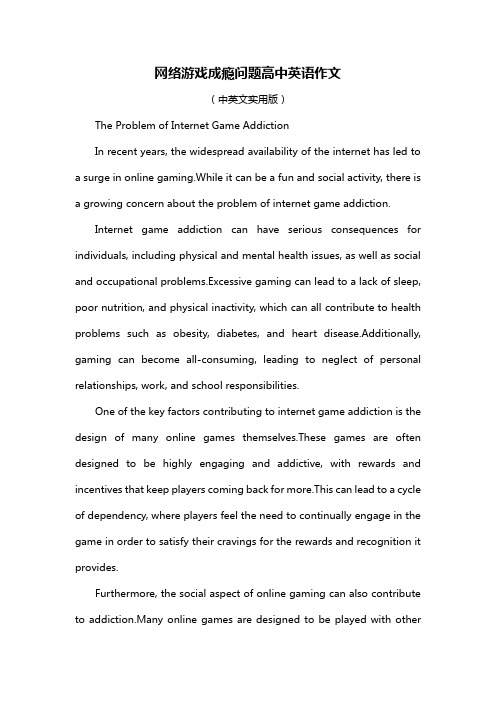
网络游戏成瘾问题高中英语作文(中英文实用版)The Problem of Internet Game AddictionIn recent years, the widespread availability of the internet has led to a surge in online gaming.While it can be a fun and social activity, there is a growing concern about the problem of internet game addiction.Internet game addiction can have serious consequences for individuals, including physical and mental health issues, as well as social and occupational problems.Excessive gaming can lead to a lack of sleep, poor nutrition, and physical inactivity, which can all contribute to health problems such as obesity, diabetes, and heart disease.Additionally, gaming can become all-consuming, leading to neglect of personal relationships, work, and school responsibilities.One of the key factors contributing to internet game addiction is the design of many online games themselves.These games are often designed to be highly engaging and addictive, with rewards and incentives that keep players coming back for more.This can lead to a cycle of dependency, where players feel the need to continually engage in the game in order to satisfy their cravings for the rewards and recognition it provides.Furthermore, the social aspect of online gaming can also contribute to addiction.Many online games are designed to be played with otherplayers, which can create a sense of community and camaraderie among players.However, this can also lead to negative consequences, such as online bullying and addiction to virtual relationships.To address the problem of internet game addiction, it is important to take a multi-faceted approach.First, individuals should be aware of the signs of addiction and seek help if they recognize these signs in themselves or others.Second, parents and educators should be vigilant about monitoring the gaming habits of children and adolescents, and help them establish healthy boundaries around gaming.Finally, policymakers and game developers should work together to implement regulations and guidelines to reduce the addictive potential of online games.In conclusion, the problem of internet game addiction is a serious issue that requires attention and action.By raising awareness, promoting healthy gaming habits, and implementing regulations, we can help reduce the negative consequences of excessive gaming and ensure that online gaming remains a fun and safe activity for all users.。
网瘾英语范文

网瘾英语范文Internet addiction is a growing concern in today's society. With the increasing popularity and accessibility of the internet, more and more people are becoming addicted to it. This addiction can have severe negative impacts on individuals' physical and mental health, as well as their overall well-being.There are several reasons why people become addicted to the internet. Firstly, the internet provides a sense of escape and anonymity. People can create online personas and engage in activities that they may not feel comfortable doing in real life. This can be especially appealing for individuals who have social anxiety or feel disconnected from the real world.Secondly, the internet offers a wide range of entertainment options. From online gaming to streaming movies and TV shows, there is an endless amount of content available. This constant stimulation can be addicting, as individuals seek out the next source of entertainment tofill their time.Additionally, the internet provides a platform forsocial interaction. Social media platforms, such as Facebook and Instagram, allow individuals to connect with others and share their lives. This constant need for validation and connection can lead to addictive behaviors, as individuals constantly check for updates and notifications.The consequences of internet addiction can be severe. Physically, individuals may experience headaches, eye strain, and sleep disturbances due to excessive screen time. Mentally, internet addiction can lead to anxiety, depression, and feelings of isolation. It can alsonegatively impact relationships, as individuals mayprioritize online interactions over real-life connections.In order to combat internet addiction, it is importantfor individuals to set boundaries and establish healthy habits. This can include limiting screen time, setting specific times for internet use, and engaging in offline activities. Seeking support from friends, family, or professionals can also be beneficial in overcoming addiction.网瘾是当今社会日益严重的问题。
网络成瘾现象英文作文
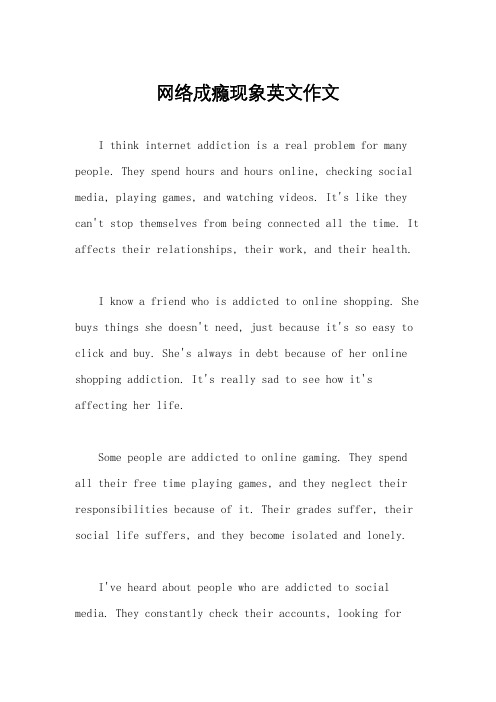
网络成瘾现象英文作文I think internet addiction is a real problem for many people. They spend hours and hours online, checking social media, playing games, and watching videos. It's like they can't stop themselves from being connected all the time. It affects their relationships, their work, and their health.I know a friend who is addicted to online shopping. She buys things she doesn't need, just because it's so easy to click and buy. She's always in debt because of her online shopping addiction. It's really sad to see how it's affecting her life.Some people are addicted to online gaming. They spend all their free time playing games, and they neglect their responsibilities because of it. Their grades suffer, their social life suffers, and they become isolated and lonely.I've heard about people who are addicted to social media. They constantly check their accounts, looking forlikes and comments. They compare themselves to others and feel bad about themselves. It's like they can't be happy without the validation of others online.I think internet addiction is a serious problem that needs to be addressed. People need to learn how to disconnect and live in the real world. They need to find balance in their lives and not let the internet take over. It's important to have real connections with people, and not just online ones.。
网络成瘾危害英文作文
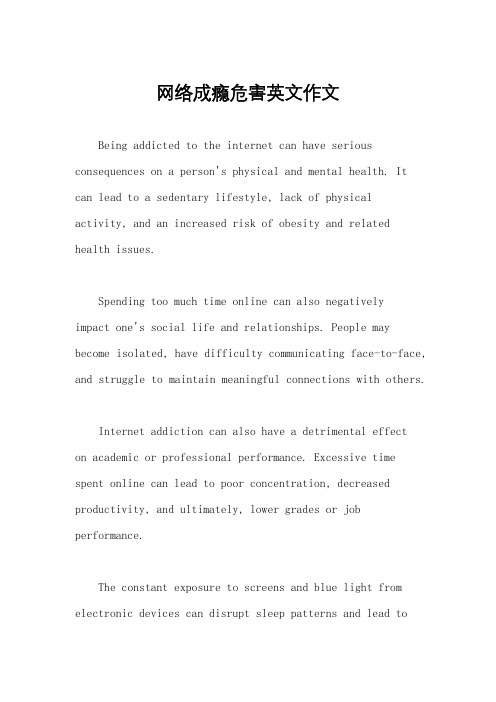
网络成瘾危害英文作文Being addicted to the internet can have serious consequences on a person's physical and mental health. It can lead to a sedentary lifestyle, lack of physicalactivity, and an increased risk of obesity and relatedhealth issues.Spending too much time online can also negativelyimpact one's social life and relationships. People may become isolated, have difficulty communicating face-to-face, and struggle to maintain meaningful connections with others.Internet addiction can also have a detrimental effecton academic or professional performance. Excessive time spent online can lead to poor concentration, decreased productivity, and ultimately, lower grades or job performance.The constant exposure to screens and blue light from electronic devices can disrupt sleep patterns and lead toinsomnia, fatigue, and other sleep-related issues.In extreme cases, internet addiction can contribute to the development of mental health disorders such as anxiety, depression, and even addiction to other substances or behaviors.The financial implications of internet addiction should not be overlooked. Excessive online gaming, gambling, or shopping can lead to significant financial strain and debt, impacting one's overall well-being and quality of life.。
游戏成瘾作文英文
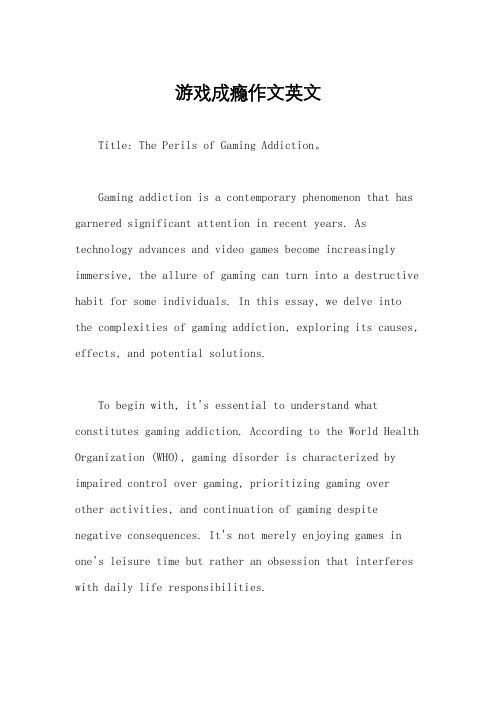
游戏成瘾作文英文Title: The Perils of Gaming Addiction。
Gaming addiction is a contemporary phenomenon that has garnered significant attention in recent years. As technology advances and video games become increasingly immersive, the allure of gaming can turn into a destructive habit for some individuals. In this essay, we delve into the complexities of gaming addiction, exploring its causes, effects, and potential solutions.To begin with, it's essential to understand what constitutes gaming addiction. According to the World Health Organization (WHO), gaming disorder is characterized by impaired control over gaming, prioritizing gaming over other activities, and continuation of gaming despite negative consequences. It's not merely enjoying games in one's leisure time but rather an obsession that interferes with daily life responsibilities.There are several factors that contribute to the development of gaming addiction. Firstly, the design of modern video games is meticulously crafted to be engaging and addictive. Game developers employ various techniques such as rewards, progression systems, and socialinteraction to keep players hooked for extended periods. Additionally, the escapism offered by games can be appealing to individuals facing stress, anxiety, or dissatisfaction in their real lives. Gaming provides a temporary retreat from reality, offering a sense of accomplishment and control that may be lacking elsewhere.The effects of gaming addiction can be profound andfar-reaching. Excessive gaming can lead to physical health problems such as obesity, repetitive strain injuries, and poor sleep patterns. Moreover, it can have detrimental effects on mental health, exacerbating conditions like depression and anxiety. Socially, gaming addiction can lead to isolation and strained relationships, as individuals prioritize gaming over spending time with friends and family. Academic and occupational performance may also suffer, as time spent gaming detracts from study or workresponsibilities.Addressing gaming addiction requires a multifaceted approach involving individuals, families, communities, and policymakers. Firstly, raising awareness about the risks of gaming addiction is crucial. Education programs can help individuals recognize the signs of addiction and seek help when needed. Parents and guardians play a vital role in monitoring their children's gaming habits and setting appropriate limits. Open communication and setting boundaries around gaming can help prevent excessive use.Furthermore, game developers have a responsibility to create games that are not only entertaining but also promote healthy gaming habits. Implementing features that encourage breaks, limit playing time, and provide resources for seeking help can mitigate the risk of addiction. Online gaming platforms can also play a role by promoting responsible gaming practices and providing support for those struggling with addiction.At the societal level, there is a need for policies andregulations that address gaming addiction effectively. This includes measures such as age restrictions on gaming purchases, limiting advertising targeting children, and allocating resources for addiction treatment and support services. Additionally, promoting alternative recreational activities and fostering a culture that values balance and moderation can help reduce the prevalence of gaming addiction.In conclusion, gaming addiction poses significant challenges in today's digital age. While gaming can be a source of entertainment and socialization, it can also spiral into addiction with serious consequences for individuals and society. By raising awareness, promoting responsible gaming practices, and implementing effective policies, we can address gaming addiction and create a healthier relationship with technology and entertainment.。
英语作文网络成瘾
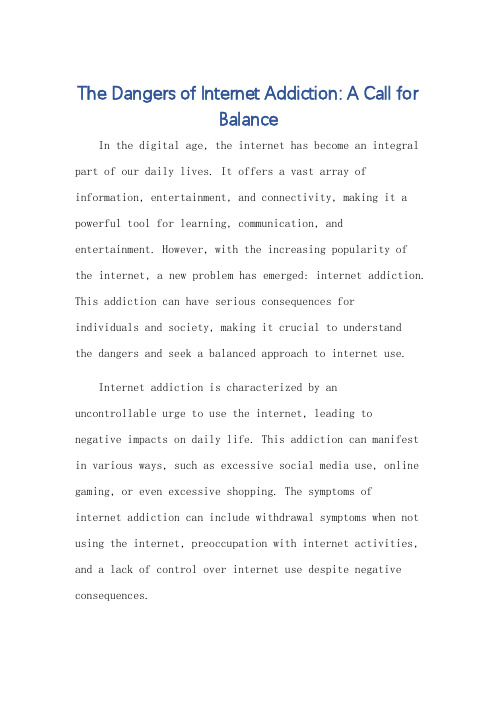
The Dangers of Internet Addiction: A Call forBalanceIn the digital age, the internet has become an integral part of our daily lives. It offers a vast array of information, entertainment, and connectivity, making it a powerful tool for learning, communication, and entertainment. However, with the increasing popularity of the internet, a new problem has emerged: internet addiction. This addiction can have serious consequences forindividuals and society, making it crucial to understandthe dangers and seek a balanced approach to internet use.Internet addiction is characterized by anuncontrollable urge to use the internet, leading tonegative impacts on daily life. This addiction can manifest in various ways, such as excessive social media use, online gaming, or even excessive shopping. The symptoms ofinternet addiction can include withdrawal symptoms when not using the internet, preoccupation with internet activities, and a lack of control over internet use despite negative consequences.One of the primary dangers of internet addiction is its impact on mental health. Excessive internet use can lead to feelings of anxiety, depression, and isolation. It can also interfere with sleep patterns, leading to fatigue and a decrease in overall well-being. Furthermore, internet addiction can impact an individual's social life, leading to a lack of face-to-face interactions and a decrease in social skills.Another danger of internet addiction is its impact on academic and professional performance. Students and professionals who are addicted to the internet may find it difficult to focus on their studies or work, leading to a decrease in performance and productivity. This can have a significant impact on their future opportunities and success.Moreover, internet addiction can have a negative impact on family relationships. Individuals who are addicted to the internet may neglect their family members, leading to a breakdown in communication and trust. This can create a tense and unhealthy environment within the family.To address the issue of internet addiction, it is crucial to adopt a balanced approach to internet use. This includes setting limits on internet use, taking breaks from the internet, and engaging in other activities that promote physical and mental well-being. It is also important to seek support from family, friends, and professionals if an individual feels they may have a problem with internet addiction.In conclusion, internet addiction is a serious problem that can have far-reaching consequences for individuals and society. It is crucial to understand the dangers ofinternet addiction and seek a balanced approach to internet use. By doing so, we can ensure that the internet remains a positive force in our lives, rather than a destructive force that leads to addiction and negative outcomes.**网络成瘾的危害:寻求平衡**在数字化时代,互联网已成为我们日常生活中不可或缺的一部分。
网络游戏成瘾的问题高中生英语作文
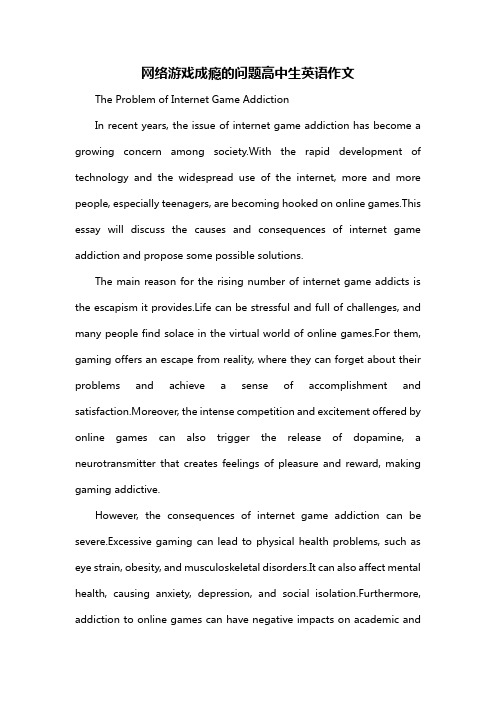
网络游戏成瘾的问题高中生英语作文The Problem of Internet Game AddictionIn recent years, the issue of internet game addiction has become a growing concern among society.With the rapid development of technology and the widespread use of the internet, more and more people, especially teenagers, are becoming hooked on online games.This essay will discuss the causes and consequences of internet game addiction and propose some possible solutions.The main reason for the rising number of internet game addicts is the escapism it provides.Life can be stressful and full of challenges, and many people find solace in the virtual world of online games.For them, gaming offers an escape from reality, where they can forget about their problems and achieve a sense of accomplishment and satisfaction.Moreover, the intense competition and excitement offered by online games can also trigger the release of dopamine, a neurotransmitter that creates feelings of pleasure and reward, making gaming addictive.However, the consequences of internet game addiction can be severe.Excessive gaming can lead to physical health problems, such as eye strain, obesity, and musculoskeletal disorders.It can also affect mental health, causing anxiety, depression, and social isolation.Furthermore, addiction to online games can have negative impacts on academic andprofessional performance, as it consumes a significant amount of time and energy that could be devoted to more productive activities.To address the issue of internet game addiction, several measures can be taken.Firstly, it is essential to raise awareness about the potential risks of excessive gaming and promote a healthy gaming culture.Parents and educators should educate teenagers about the importance of balancing gaming with other activities, such as exercise, socializing, and studying.Secondly, game developers and platforms should implement stricter regulations and controls to prevent underage gaming and limit the amount of time players can spend on their games.Additionally, it is crucial to provide support and treatment for those who are already addicted, such as counseling and therapy.In conclusion, the problem of internet game addiction is a complex issue that requires the attention and effort of society as a whole.By understanding the causes and consequences of addiction and implementing effective measures, we can protect the well-being of our youth and ensure a healthier, more balanced approach to gaming.。
网络成瘾的影响英文作文
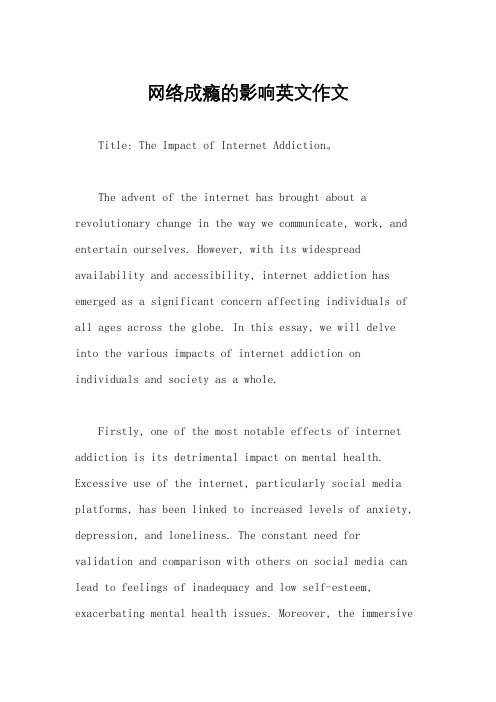
网络成瘾的影响英文作文Title: The Impact of Internet Addiction。
The advent of the internet has brought about a revolutionary change in the way we communicate, work, and entertain ourselves. However, with its widespread availability and accessibility, internet addiction has emerged as a significant concern affecting individuals of all ages across the globe. In this essay, we will delve into the various impacts of internet addiction on individuals and society as a whole.Firstly, one of the most notable effects of internet addiction is its detrimental impact on mental health. Excessive use of the internet, particularly social media platforms, has been linked to increased levels of anxiety, depression, and loneliness. The constant need for validation and comparison with others on social media can lead to feelings of inadequacy and low self-esteem, exacerbating mental health issues. Moreover, the immersivenature of online gaming can result in addictive behaviors, further exacerbating psychological problems.Secondly, internet addiction can have profound consequences on physical health. Spending prolonged hours in front of screens can lead to sedentary lifestyles, increasing the risk of obesity, diabetes, and cardiovascular diseases. Moreover, the blue light emitted by screens can disrupt sleep patterns, leading to insomnia and fatigue. Additionally, excessive internet use can lead to musculoskeletal problems such as neck and back pain, as well as eye strain and headaches.Furthermore, internet addiction can adversely affect academic and professional performance. Students who are addicted to the internet may experience a decline in academic performance due to procrastination, difficulty concentrating, and lack of motivation. Similarly, employees who spend excessive time browsing the internet during work hours may experience decreased productivity and job satisfaction, jeopardizing their career prospects.Moreover, internet addiction can strain interpersonal relationships. Excessive internet use can lead to neglect of real-life social interactions, causing rifts between family members and friends. Furthermore, individuals who are addicted to the internet may exhibit irritability and withdrawal symptoms when offline, making it challenging to maintain healthy relationships.In addition to its individual impacts, internet addiction also poses societal challenges. The proliferation of fake news and misinformation on the internet can contribute to the polarization of society and undermine democratic values. Moreover, internet addiction can strain healthcare systems, as individuals struggling with mental and physical health issues seek treatment for their symptoms.To address the issue of internet addiction, it is essential to promote awareness and education about responsible internet use. Parents, educators, and policymakers play a crucial role in teaching individuals, especially children and adolescents, about the importanceof balanced screen time and healthy digital habits. Additionally, mental health professionals should be equipped to identify and treat internet addiction as a legitimate mental health disorder.In conclusion, internet addiction has far-reaching implications for individuals and society, affecting mental, physical, academic, and social well-being. Recognizing the signs and consequences of internet addiction is the first step towards addressing this growing concern and promoting healthier digital lifestyles. By fostering a culture of responsible internet use, we can mitigate the negative impacts of internet addiction and harness the benefits of the digital age.。
网络游戏成瘾的原因与解决办法高中英语作文
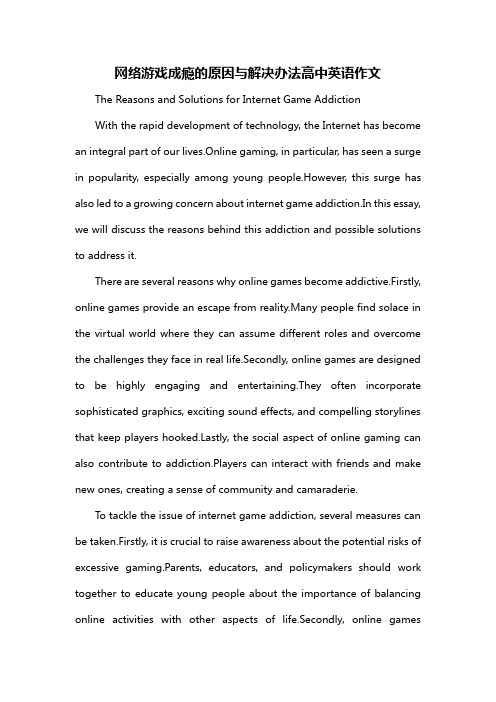
网络游戏成瘾的原因与解决办法高中英语作文The Reasons and Solutions for Internet Game AddictionWith the rapid development of technology, the Internet has become an integral part of our lives.Online gaming, in particular, has seen a surge in popularity, especially among young people.However, this surge has also led to a growing concern about internet game addiction.In this essay, we will discuss the reasons behind this addiction and possible solutions to address it.There are several reasons why online games become addictive.Firstly, online games provide an escape from reality.Many people find solace in the virtual world where they can assume different roles and overcome the challenges they face in real life.Secondly, online games are designed to be highly engaging and entertaining.They often incorporate sophisticated graphics, exciting sound effects, and compelling storylines that keep players stly, the social aspect of online gaming can also contribute to addiction.Players can interact with friends and make new ones, creating a sense of community and camaraderie.To tackle the issue of internet game addiction, several measures can be taken.Firstly, it is crucial to raise awareness about the potential risks of excessive gaming.Parents, educators, and policymakers should work together to educate young people about the importance of balancing online activities with other aspects of life.Secondly, online gamescompanies should take responsibility by implementing stricter regulations, such as limiting the amount of time players can spend gaming and ensuring that games are age-appropriate.Additionally, providing alternative activities and hobbies for young people to engage in can help reduce their reliance on online gaming.Encouraging participation in sports, arts, and social clubs can offer healthy outlets for their energy and interests.In conclusion, while online gaming can be a fun and enjoyable activity, it is essential to recognize the potential risks of addiction.By understanding the reasons behind this addiction and implementing effective solutions, we can help ensure that online gaming remains a healthy and enjoyable pastime for everyone.。
网络成瘾作文英文
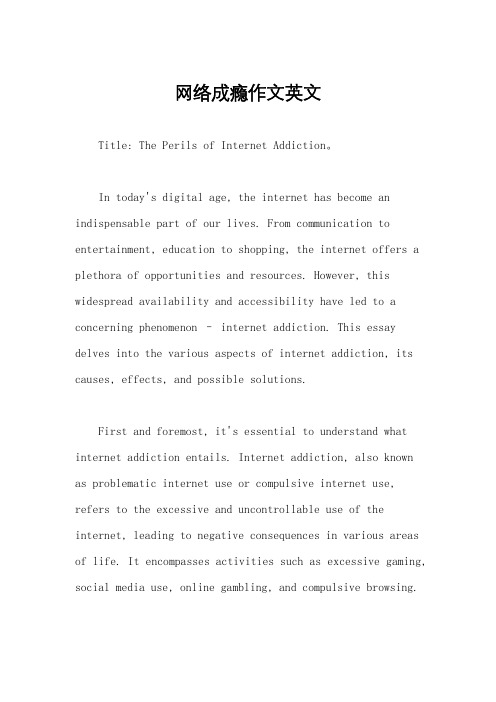
网络成瘾作文英文Title: The Perils of Internet Addiction。
In today's digital age, the internet has become an indispensable part of our lives. From communication to entertainment, education to shopping, the internet offers a plethora of opportunities and resources. However, this widespread availability and accessibility have led to a concerning phenomenon – internet addiction. This essay delves into the various aspects of internet addiction, its causes, effects, and possible solutions.First and foremost, it's essential to understand what internet addiction entails. Internet addiction, also known as problematic internet use or compulsive internet use, refers to the excessive and uncontrollable use of the internet, leading to negative consequences in various areas of life. It encompasses activities such as excessive gaming, social media use, online gambling, and compulsive browsing.One of the primary causes of internet addiction is the ease of access and the abundance of online content. With just a few clicks, one can immerse oneself in endless streams of information, entertainment, and social interactions. The constant stimulation and instant gratification provided by the internet can be highly addictive, leading individuals to spend increasing amounts of time online, often at the expense of real-lifeactivities and responsibilities.Moreover, certain psychological factors can predispose individuals to develop internet addiction. For some, the internet serves as a means of escape from real-life problems or feelings of loneliness and depression. The anonymity offered by online interactions can also embolden individuals to engage in behaviors they might refrain from in face-to-face interactions, further fueling addictive tendencies.The consequences of internet addiction can be far-reaching and detrimental. Excessive internet use candisrupt sleep patterns, leading to insomnia and fatigue. Itcan also adversely affect mental health, contributing to anxiety, depression, and social isolation. In extreme cases, internet addiction can impair academic or professional performance, strain relationships, and even lead tofinancial ruin, especially in the case of online gambling addiction.Addressing internet addiction requires a multifaceted approach. Education and awareness play a crucial role in helping individuals recognize the signs of addiction and understand its potential consequences. Additionally, establishing healthy internet usage habits, such as setting limits on screen time and taking regular breaks, can help prevent addiction from taking hold.Furthermore, it's essential to address underlying psychological issues that may contribute to internet addiction. Counseling and therapy can provide individuals with coping mechanisms for dealing with stress, anxiety,and other emotional challenges, reducing the need to turnto the internet for solace.From a societal perspective, regulating access to certain online content, particularly that which isaddictive or harmful, can help mitigate the prevalence of internet addiction. However, it's essential to strike a balance between protecting individuals from harm and preserving freedom of expression and access to information.In conclusion, internet addiction poses a significant threat to individuals' well-being and society at large. By understanding its causes, effects, and potential solutions, we can work towards promoting healthier internet usage habits and mitigating the negative impact of excessive internet use. It's crucial for individuals, families, educators, and policymakers to collaborate in addressing this growing concern and fostering a more balanced relationship with the internet.。
大学生网游防沉迷英文作文120词
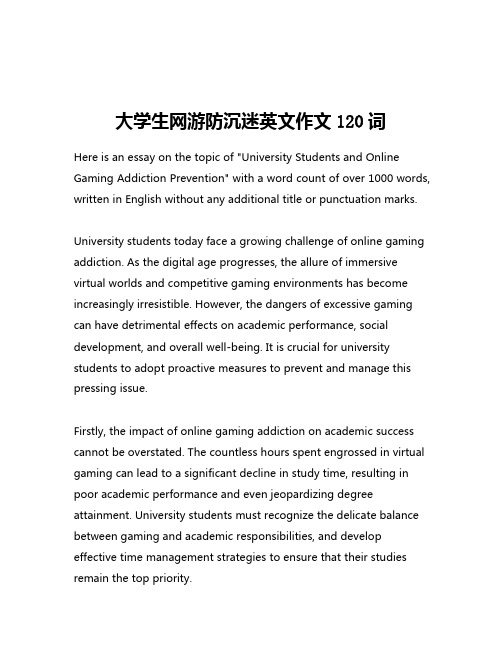
大学生网游防沉迷英文作文120词Here is an essay on the topic of "University Students and Online Gaming Addiction Prevention" with a word count of over 1000 words, written in English without any additional title or punctuation marks.University students today face a growing challenge of online gaming addiction. As the digital age progresses, the allure of immersive virtual worlds and competitive gaming environments has become increasingly irresistible. However, the dangers of excessive gaming can have detrimental effects on academic performance, social development, and overall well-being. It is crucial for university students to adopt proactive measures to prevent and manage this pressing issue.Firstly, the impact of online gaming addiction on academic success cannot be overstated. The countless hours spent engrossed in virtual gaming can lead to a significant decline in study time, resulting in poor academic performance and even jeopardizing degree attainment. University students must recognize the delicate balance between gaming and academic responsibilities, and develop effective time management strategies to ensure that their studies remain the top priority.Moreover, the social implications of online gaming addiction can be profound. As students become increasingly isolated in their virtual worlds, they may struggle to maintain meaningful interpersonal relationships and engage in face-to-face social interactions. This can lead to a sense of loneliness, social anxiety, and a diminished ability to develop essential communication and collaboration skills. University communities must foster an environment that encourages a healthy balance between online and offline social activities, promoting the development of well-rounded individuals.In addition to the academic and social consequences, excessive online gaming can also have detrimental effects on physical and mental health. The sedentary nature of gaming can contribute to a lack of physical activity, leading to issues such as obesity, poor posture, and musculoskeletal problems. Furthermore, the immersive nature of gaming can disrupt sleep patterns, impair cognitive function, and exacerbate mental health conditions like anxiety and depression. University students must be proactive in prioritizing their overall well-being, incorporating regular exercise, healthy sleep habits, and mindfulness practices into their daily routines.To effectively address the challenge of online gaming addiction, university students must adopt a multifaceted approach. First and foremost, they should strive to develop a heightened awareness oftheir gaming habits and the potential risks associated with excessive play. This self-reflection can serve as a crucial starting point in recognizing the need for change and taking proactive steps to manage their gaming behavior.One effective strategy is to establish clear boundaries and limits on gaming time. This may involve setting daily or weekly time limits, designating specific gaming-free periods, or even temporarily abstaining from gaming altogether. By implementing these boundaries, students can reclaim control over their time and redirect their energy towards more constructive pursuits.Additionally, university students should seek to cultivate a diverse range of interests and hobbies beyond gaming. Engaging in physical activities, pursuing creative endeavors, volunteering, or joining student organizations can provide a healthy outlet for their time and energy, fostering a more balanced and fulfilling university experience.Furthermore, seeking support from peers, family members, or university counseling services can be instrumental in overcoming gaming addiction. Sharing experiences, gaining accountability, and accessing professional guidance can empower students to develop effective coping mechanisms and establish a sustainable, healthy relationship with gaming.Universities also have a vital role to play in addressing the issue of online gaming addiction among their student populations. By implementing comprehensive education and awareness programs, universities can equip students with the knowledge and resources needed to recognize the signs of addiction and access appropriate support services. Additionally, universities should consider integrating gaming addiction prevention strategies into their broader mental health and wellness initiatives, ensuring a holistic approach to student well-being.In conclusion, the challenge of online gaming addiction among university students is a complex and multifaceted issue that requires a collaborative effort from both individuals and institutions. By developing a heightened awareness, establishing healthy boundaries, cultivating diverse interests, and seeking support, university students can take proactive steps to prevent and manage the detrimental effects of excessive gaming. Through a comprehensive approach that prioritizes academic success, social development, and overall well-being, university students can thrive in the digital age while maintaining a balanced and fulfilling university experience.。
电子游戏成瘾英语作文
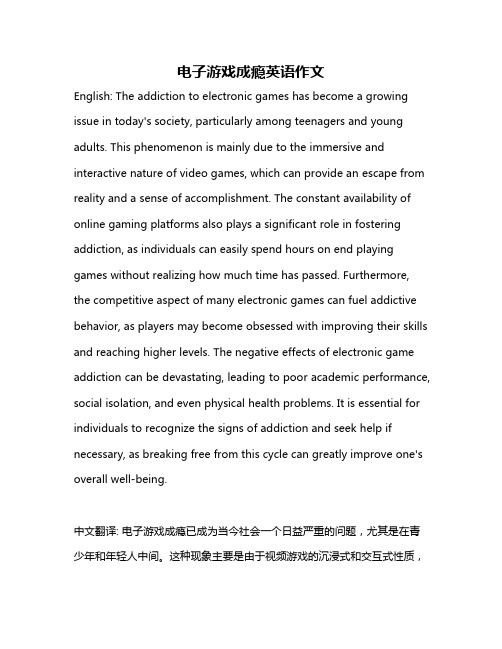
电子游戏成瘾英语作文English: The addiction to electronic games has become a growing issue in today's society, particularly among teenagers and young adults. This phenomenon is mainly due to the immersive and interactive nature of video games, which can provide an escape from reality and a sense of accomplishment. The constant availability of online gaming platforms also plays a significant role in fostering addiction, as individuals can easily spend hours on end playing games without realizing how much time has passed. Furthermore, the competitive aspect of many electronic games can fuel addictive behavior, as players may become obsessed with improving their skills and reaching higher levels. The negative effects of electronic game addiction can be devastating, leading to poor academic performance, social isolation, and even physical health problems. It is essential for individuals to recognize the signs of addiction and seek help if necessary, as breaking free from this cycle can greatly improve one's overall well-being.中文翻译: 电子游戏成瘾已成为当今社会一个日益严重的问题,尤其是在青少年和年轻人中间。
网瘾现象英语作文
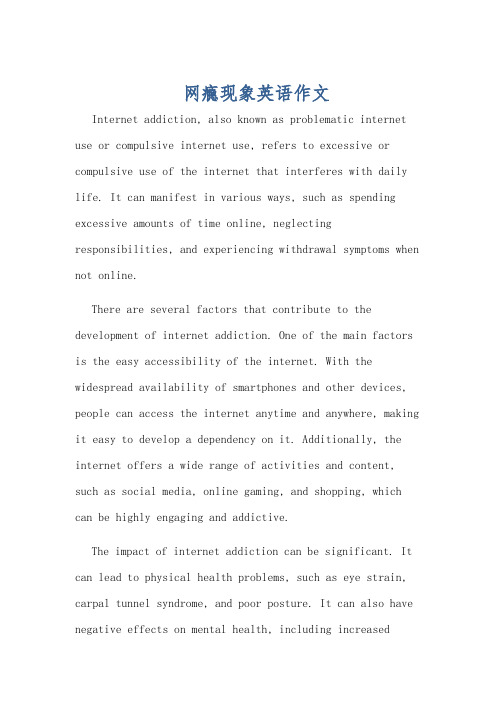
网瘾现象英语作文Internet addiction, also known as problematic internet use or compulsive internet use, refers to excessive or compulsive use of the internet that interferes with daily life. It can manifest in various ways, such as spending excessive amounts of time online, neglecting responsibilities, and experiencing withdrawal symptoms when not online.There are several factors that contribute to the development of internet addiction. One of the main factors is the easy accessibility of the internet. With the widespread availability of smartphones and other devices, people can access the internet anytime and anywhere, making it easy to develop a dependency on it. Additionally, the internet offers a wide range of activities and content, such as social media, online gaming, and shopping, which can be highly engaging and addictive.The impact of internet addiction can be significant. It can lead to physical health problems, such as eye strain, carpal tunnel syndrome, and poor posture. It can also have negative effects on mental health, including increasedanxiety, depression, and social isolation. In extreme cases, it can even lead to academic or occupational problems, as individuals may neglect their responsibilities in favor of spending time online.To address internet addiction, it is important to recognize the signs and symptoms and seek help if necessary. This can involve setting limits on internet use, seeking support from friends and family, and seeking professional help from a therapist or counselor. Additionally, finding alternative activities and hobbies that do not involve the internet can be beneficial in reducing dependency.网瘾现象,也称为问题性上网或强迫性上网,指的是对互联网的过度或强迫性使用,影响日常生活。
关于网隐瘾的英语作文

关于网隐瘾的英语作文English: Internet addiction, also known as net addiction or internet dependency, refers to the excessive use of the internet that interferes with daily life activities. This addiction can manifest in various forms, such as excessive gaming, social media usage, or online shopping. Individuals who suffer from internet addiction often experience negative consequences, including poor academic or work performance, strained relationships with family and friends, and even physical health issues due to a sedentary lifestyle. The constant need to be connected online can lead to sleep disturbances, anxiety, and depression. It is essential to recognize the signs of internet addiction and seek help if necessary to regain control over one's internet usage and prioritize real-life interactions.中文翻译: 网络依赖症,也称为网瘾或网络成瘾,指的是对互联网的过度使用干扰了日常生活活动。
网瘾社会现象英语作文
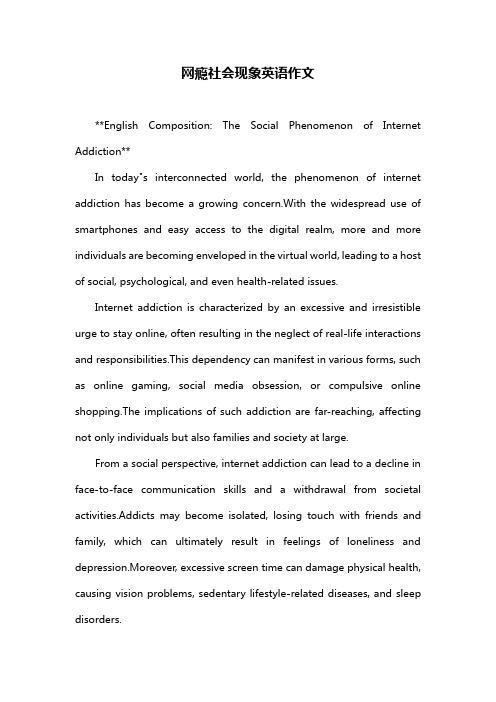
网瘾社会现象英语作文**English Composition: The Social Phenomenon of Internet Addiction**In today"s interconnected world, the phenomenon of internet addiction has become a growing concern.With the widespread use of smartphones and easy access to the digital realm, more and more individuals are becoming enveloped in the virtual world, leading to a host of social, psychological, and even health-related issues.Internet addiction is characterized by an excessive and irresistible urge to stay online, often resulting in the neglect of real-life interactions and responsibilities.This dependency can manifest in various forms, such as online gaming, social media obsession, or compulsive online shopping.The implications of such addiction are far-reaching, affecting not only individuals but also families and society at large.From a social perspective, internet addiction can lead to a decline in face-to-face communication skills and a withdrawal from societal activities.Addicts may become isolated, losing touch with friends and family, which can ultimately result in feelings of loneliness and depression.Moreover, excessive screen time can damage physical health, causing vision problems, sedentary lifestyle-related diseases, and sleep disorders.In terms of mental health, the constant need for online validation and the fear of missing out can create anxiety and low self-esteem.Cyberbullying and online comparison can further exacerbate these issues, especially among the younger generation.Societies must address this issue cational programs, awareness campaigns, and strict regulations on online content and gaming can help mitigate the problem.Families and schools should play a pivotal role in monitoring the internet usage of children and promoting a healthy balance between online activities and real-life engagement.In conclusion, the social phenomenon of internet addiction is a multifaceted issue that requires immediate attention.By recognizing the signs and implementing strategies to counteract this addiction, we can strive for a healthier and more balanced lifestyle in the digital age.**中文作文:网瘾社会现象**在当今相互连接的世界中,网瘾现象已成为一个日益严重的问题。
如何预防网游成瘾英语作文
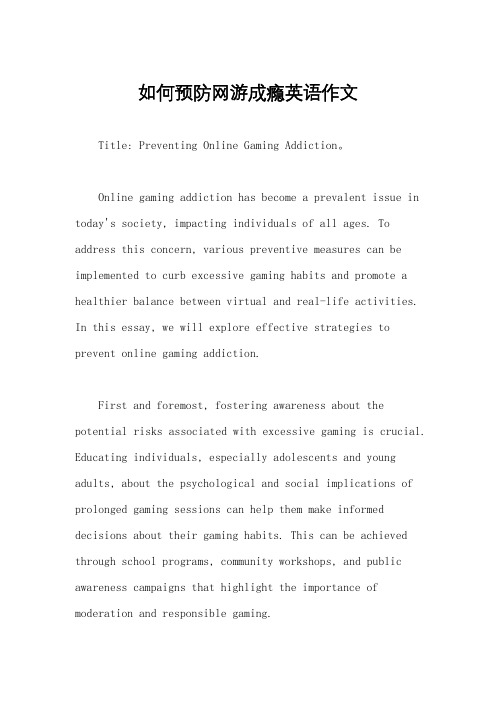
如何预防网游成瘾英语作文Title: Preventing Online Gaming Addiction。
Online gaming addiction has become a prevalent issue in today's society, impacting individuals of all ages. To address this concern, various preventive measures can be implemented to curb excessive gaming habits and promote a healthier balance between virtual and real-life activities. In this essay, we will explore effective strategies to prevent online gaming addiction.First and foremost, fostering awareness about the potential risks associated with excessive gaming is crucial. Educating individuals, especially adolescents and young adults, about the psychological and social implications of prolonged gaming sessions can help them make informed decisions about their gaming habits. This can be achieved through school programs, community workshops, and public awareness campaigns that highlight the importance of moderation and responsible gaming.Secondly, parental involvement plays a pivotal role in preventing online gaming addiction among children and teenagers. Parents should actively monitor their children's gaming activities, set reasonable limits on screen time, and encourage alternative forms of leisure activities such as outdoor sports, arts and crafts, or socializing with friends in person. Open communication between parents and children regarding gaming habits is essential to address any concerns and establish healthy boundaries.Moreover, creating a supportive and balanced gaming environment at home is essential. This involves setting up designated gaming areas with limited access to electronic devices, establishing family rules regarding screen time and gaming schedules, and promoting other activities that promote physical, mental, and social well-being. By fostering a positive gaming environment that emphasizes moderation and balance, households can mitigate the risk of gaming addiction.Furthermore, schools and educational institutions canplay a significant role in preventing online gaming addiction by integrating digital literacy and wellness programs into their curriculum. These programs can educate students about the addictive nature of online gaming, teach them healthy coping mechanisms for managing stress and boredom, and provide resources for seeking help if gaming habits become problematic. Additionally, schools can collaborate with mental health professionals to identifyat-risk students and provide early intervention and support services.In addition to preventive measures at the individual and familial levels, government regulations and industry initiatives are also crucial in addressing online gaming addiction. Governments can enact policies that regulate the marketing and promotion of online games, restrict access to gaming websites and apps for underage users during certain hours, and allocate resources for research and public awareness campaigns on gaming addiction. Similarly, gaming companies can implement features such as time limits, in-game rewards for taking breaks, and parental control tools to help players manage their gaming habits responsibly.In conclusion, preventing online gaming addiction requires a multi-faceted approach that involves collaboration between individuals, families, schools, governments, and the gaming industry. By raising awareness, promoting parental involvement, fostering a balanced gaming environment, integrating wellness programs into education, and implementing regulatory measures, we can mitigate the risks associated with excessive gaming and promotehealthier lifestyles in the digital age.。
- 1、下载文档前请自行甄别文档内容的完整性,平台不提供额外的编辑、内容补充、找答案等附加服务。
- 2、"仅部分预览"的文档,不可在线预览部分如存在完整性等问题,可反馈申请退款(可完整预览的文档不适用该条件!)。
- 3、如文档侵犯您的权益,请联系客服反馈,我们会尽快为您处理(人工客服工作时间:9:00-18:30)。
文献信息:文献标题:Risk factors associated with online game addiction: A hierarchical model(与网络游戏成瘾相关的风险因素:层次模型)国外作者:Hyun, Gi Jung, et al文献出处:《Computers in human behavior》,2015,48:706-713.字数统计:英文2884单词,16605字符;中文5177汉字外文文献:Risk factors associated with online game addiction:A hierarchical modelAbstract Online gaming addiction has been increasingly recognized as a mental disorder. However, the predictive factors that lead to online gaming addiction are not well established. The aim of this study was to identify factors that may infiuence the development of online gaming addiction. A total of 263 patients with problematic online gaming addiction (255 males (97%) and 8 females (3%), age: mean = 20.4 ± 5.8 years) and 153 healthy comparison subjects (118 males (77%) and 35 females (23%), age: 21.2 ± 5.5 years, range) were recruited for participation in the current study. Hierarchical logistic regression analyses among each set of variables were conducted. Individual factors (sex and age), cognitive factors (IQ and perseverative errors), psychopathological conditions (ADHD, depression, anxiety, and impulsivity), and social interaction factors (family environment, social anxiety, and self-esteem) were evaluated in a stepwise fashion. All four factors were associated with online gaming addiction, with psychopathological conditions being the strongest risk factors for the addiction. Individual factors, psychological factors, and social interactions were associated with the development of pure online gaming addiction. As before, psychological factors (attention, mood, anxiety and impulsivity) were the strongest risk factors for online gaming addiction in patients with pure online gamingaddiction. Psychopathologies, including ADHD and depression, were the strongest factors associated with the development of online gaming addiction in individuals.Key words: Online gaming addiction; Social interaction; Psychopathology Individual factors; Cognitive functions1.IntroductionRecently, it has been suggested that internet addiction is a mental health problem (Lam, Peng, Mai, & Jing, 2009). Internet addiction may impair daily life, academic performance, family relationships, and emotional development, particularly among adolescents. Since 1996, when the concept of ‘‘internet addiction’’ was introduced as a new clinical disorder, internet addiction has been studied in terms of the physical and psychological consequences, particularly in China, Korea. However, the causes or aggravating factors that lead to internet addiction remain unknown, although many studies have attempted to explore its causes in terms of demographic factors, psychopathological conditions, psychosocial and family environment, and cognitive functions (Aboujaoude, Koran, Gamel, Large, & Serpe, 2006; Ha et al., 2006; Park et al., 2011; Tsai et al., 2009; Wang & Wang, 2013).In general, individual factors related to online gaming addiction such as sex and age have been considered in previous studies. Most studies report that the male sex conveys a 2–3 times higher risk for internet addiction than the female sex (Lee, Han, Kim, & Renshaw, 2013; Sasmaz et al., 2014). In addition, older age has been reported to be a risk factor for internet addiction among adolescents (Ahmadi & Saghafi, 2013).In terms of causal cognitive factors for online gaming addiction, IQ and cognitive fiexibility have been considered. A study by Park et al. (2011) noted that adolescents with internet addiction have lower comprehensive sub-item scores on the Wechsler Adult Intelligence Scale (WAIS-R) in comparison to healthy control subjects. A study by Zhou, Yuan, and Yao (2012) indicated that patients with online gaming addiction demonstrate low mental fiexibility and response inhibition in modified versions of go/nogo tests. In our previous study, patients with online gamingaddiction showed increased numbers of perseverative responses and perseverative errors on the Wisconsin Card Sorting Test (Han, Lyoo, & Renshaw, 2012).Psychopathological conditions that are often co-morbid with online gaming addiction, attention deficit and hyperactivity disorder (ADHD), major depressive disorder (MDD), anxiety, and impulsivity have been considered. Several previous studies of internet addiction have noted that some symptoms in patients with problematic internet use are the same as those observed in other psychopathologies (Aboujaoude et al., 2006). For example, ADHD and MDD are the most frequent comorbid disorders in a South Korean sample population, and the clinical characteristics of internet addiction are similar to clinical symptoms in patients with ADHD or MDD (Ha et al., 2006; Park, Lee, Kim, Jeong, & Han, 2013; Yoo et al., 2004). In a survey of 987 Indian adolescents (Goel, Subramanyam, & Kamath, 2013), adolescents with higher internet addiction score also show higher scores on anxiety and depression scales. The association between violent games and aggressive behavior is controversial. Past study suggested the correlation between violent video game and aggressive behavior in healthy subjects (Anderson & Dill, 2000). However, a recent time series analysis and meta-analysis have shown that violent films are negatively correlated with aggressive behaviors (Markey, French, & Markey, in press), and there is no evidence that violent video games increase aggression in children (Ferguson, in press).In terms of social interaction factors that have been related to online gaming addiction, family environment, social anxiety, and self-esteem have been considered. Based on an online survey of 1642 people (19–60 years of age), Wang and Wang (2013) reported that excessive internet use is motivated by cyberspace social encounters in individuals with poor offiine social support, including support from family members. However, based on a survey of 2348 college students, Yen et al. (2012) suggested that the internet is a good alternative outlet for individuals with social anxiety. In contrast, Lee and Stapinski (2012) reported that online communication exacerbates face-to-face avoidance in individuals with higher levels of perceived social anxiety.Self-esteem is thought to mediate social interactions and preference for online social interactions (Caplan, 2005; Fioravanti, Dettore, & Casale, 2012; Stinson et al., 2008). Bozoglan, Demirer, and Sahin (2013) found that low self-esteem was associated with internet addiction in a sample of Turkish university students 18–24 years of age. A study by Lemenager et al. (2013) reported selfconfidence deficits in individuals characterized as major users of multiplayer online role-playing games.Each of these studies, however, focused on only one or two independent factors, without considering the hierarchical importance among variable risk factors. As observed in other addiction disorders as well as in child and adolescent disorders (Lee et al., 2013), identifying the hierarchical importance of risk factors for online gaming addiction may infiuence policy and treatment. Based on patients with online gaming addiction consecutively referred to the Online Game Clinic Center at OO University Hospital, we aimed to assess the hierarchical importance among individual factors, cognitive functions, psychopathological conditions, and levels of psychosocial and family support in patients with online gaming addiction.2.MethodThe current study screened 308 patients with problematic online gaming habits (296 males (96%) and 12 females (4%), age: mean = 21.0 ±5.9 years, range: 12–45 years) who visited the Online Game Clinic Center at OO University Hospital from June 2011 to March 2013. Through advertisements posted at OO University and OO University Medical Center, 153 healthy comparison subjects (118 males (77%) and 35 females (23%), age: 21.2 ± 5.5 years, range: 13–40 years) were recruited to voluntarily participate in the study. Both the patients and the control subjects were screened with the Structured Clinical Interview for DSM-IV (Ha et al., 2006; Kusumakar, MacMaster, Gates, Sparkes, & Khan, 2001), and patients were secondarily diagnosed with comorbidities by two child and adolescent psychiatrists. All subjects were asked to complete questionnaires regarding the severity of internet addiction, individual factors, family environment, social interactions, and comorbidities.The criteria for online game addiction in the current study were similar to those employed in other previous studies (Han, Hwang, & Renshaw, 2010; Ko et al., 2009). Factors associated with addiction included: (1) online game playing through the internet, more than 4 h per day or 30 h per week, (2) Internet Addiction Scale score >50 (Young, 1996), (3) irritable, anxious, and aggressive behaviors when compelled to stop online game playing, (4) impaired behaviors or distress, economic problems, or maladaptive patterns of regular life due to excessive online game play, and (5) irregular life patterns due to disrupted diurnal rhythms (e.g., sleeping during the day and gaming at night, irregular meals, and failure to maintain personal hygiene), school truancy, or loss of job.Exclusion criteria included: (1) a history or current episode of other Axis I psychiatric diseases, with the exception of MDD and ADHD, (2) IQ < 80, (3) substance abuse history, with the exception of alcohol or tobacco abuse, and (4) neurological or medical disorder. Ultimately, 263 patients with online gaming addiction (255 males (97%) and 8 females (3%), age: mean = 20.4 ±5.8 years, range: 12–45 years), consisting of 109 with only online gaming addiction (referred to herein as pure online gaming addiction), 92 with online gaming addiction and ADHD, and 62 with online gaming addiction and MDD, were included in the study. The patients excluded were 14 patients with multiple diagnoses of online gaming addiction plus ADHD and major depression, 11 patients with schizophrenia, 5 patients with obsessive–compulsive disorder, 4 patients with alcohol dependence, 7 patients with autism spectrum disorders, and 4 patients with mental retardation. The research protocol for the current study was approved by the OO University Hospital Institutional Review Board. Written informed consent was provided by patients older than 18 years. In adolescents younger than 18 years, written informed consent was provided by parents and adolescents.3.DiscussionOf the four risk categories including individual factors, cognitive functions, psychopathologies, and social interactions, psychopathologies were the strongest riskfactors for online gaming addiction in all patients. Specifically, sex, self-esteem, attention, depressive moods, family environment, and perseverative errors were significantly associated with online gaming addiction. In patients with pure online gaming addiction, associations were found with individual factors, psychological factors, and social interactions. Of the four categories, psychopathologies were the strongest risk factors for online gaming addiction in patients with pure online gaming addiction. Specifically, sex, age, self-esteem, attention, depressive moods, and family environment were significantly associated with online gaming addiction in these patients.3.1.Individual factorsOf the two individual factors, sex was a risk factor for online gaming addiction in all patients. Both sex and age were also associated with online gaming addiction in patients with pure online gaming addiction.Sex differences may be due to different online use between males and females. Female adolescents typically use online networking for enhancing communication and sharing information via instant messaging, chatting, and visiting personal websites. However, male adolescents mainly use online networking for playing online games (Gross, 2004). In addition, temperamental characteristics, including higher levels of novelty seeking, higher comorbidity of ADHD, and higher levels of impulsivity in males are responsible for higher rates of online gaming addiction relative to females (Bozkurt, Coskun, Ayaydin, Adak, & Zoroglu, 2013; Dalbudak et al., 2013; Ko et al., 2010; Wu et al., 2013). A study by Park et al. (2013) reports that increased age is a risk factor for online gaming addiction in adolescent patients.3.2.Cognitive factorsAlthough there are controversies in terms of the relation between cognitive function and internet addiction, the results of the current study suggest that perseverative errors but not IQ are associated with online gaming addiction. Disrupted perseverative responses have been reported in patients with internet addiction (Han, Kim, Lee, & Renshaw, 2012; Han, Lyoo et al., 2012; Zhou et al., 2012). Relative to healthy comparison subjects, patients with online gaming addiction tend to showincreased numbers of perseverative errors (Kusumakar et al., 2001). Poor executive functioning, including low mental fiexibility and response inhibition in patients with online gaming addiction, are thought to be associated with the severity of the addiction (Lemenager et al., 2013). A study by Park et al. (2011) reported that lower comprehensive sub-item scores of WAIS-R were associated with internet addiction. The results of the current study, however, did not show any correlation between IQ and online gaming addiction. The difference between the findings of Park et al. and the current research may be due to the number of subjects, the consideration of comorbidities, or the interactions between other risk factors.3.3.Psychopathological factorsPsychopathologies, especially ADHD and MDD, were the strongest risk factors for online gaming addiction in the current study. In a systematic review of 20 articles about comorbid psychopathologies and pathological internet use, Carli et al. (2013) reported that 100% of articles claim that pathological internet use is associated with symptoms of ADHD, and 75% of the articles assert that pathological internet use is associated with MDD. According to a survey of 2793 college students, adult ADHD is also associated with internet addiction (Yen, Yen, Chen, Tang, & Ko, 2009). The strong association between pathological internet use and ADHD may be related to the characteristics of ADHD, insofar as both sets of patients tend to be easily bored and thrive on instant gratification (Campbell & von Stauffenberg, 2009; Carli et al., 2013). Moreover, Fergurson and Ceranoglu suggest that pathologic gaming behavior may be a symptom of underlying ADHD rather than a unique disease (Fergurson and Ceranoglu, 2014). In our group of patients with pure online gaming addiction (i.e., patients without comorbid ADHD or MDD), K-ARS scores and K-BDI scores were also associated with online gaming addiction. In German game players, emotionally sensitive users play online games more for the purpose of interaction with friends, compared to less sensitive users (Kowert et al., 2014). These results suggest that online gaming addiction may be aggravated by sub-clinical ADHD and MDD. Although there were significant differences between the online gaming addiction group and the healthy comparison group in the present study, the characteristic ofimpulsiveness, as assessed via the BIS/BAS scale, was not associated with online gaming addiction. Many studies suggest that a high level of impulsiveness is associated with internet addiction (Bozkurt et al., 2013; Wu et al., 2013). One group has suggested that internet addiction should be classified as an impulse control disorder (Dell’Osso et al., 2008). The divergent results of the current research from previous research may be due to interaction effects among the K-ARS and K-BDI scores.3.4.Social interaction factorsThe results of the current research show that the factor of family environment within the set of social interaction factors is an important risk factor for an online gaming addiction. Tsai et al. (2009) demonstrated that offiine social support and interaction with family and colleagues in a study of 1360 university freshmen negatively correlated with internet addiction. In a study of family factors contributing to internet addiction, Yen, Yen, Chen, Chen, and Ko (2007) reported that a higher level of confiict between parents and children together with a lower level of family cohesion is a risk factor for internet addiction. A study by Han, Kim et al. (2012), Han, Lyoo et al. (2012) reported that a three-week period of intensive family intervention improved the severity of online game addiction and increased the activity of the caudate nucleus in response to the affect scene. The present study also found that family environment factors were associated with online gaming addiction. Although there were no significant results between social anxiety and online gaming addiction in the present study, social anxiety should be considered to be associated with online gaming addiction. Our result may have been due to the control of psychological factors (BAI score) in the previous analysis steps. A study by Rusconi et al. (2012) reported that increased anxiety due to social interaction is associated with prolonged use of the internet and social network services. A robust level of self-esteem is known to be a protective factor against drug and alcohol addiction, as well as internet addiction. Decreased levels of self-esteem have also been reported to be associated with internet addiction and online gaming addiction (Bozoglan et al., 2013; Lemenager et al., 2013). Practical support together with positive role models forpatients with drug or alcohol addiction could lead to successful recovery from such an addiction due to increased self-esteem (Johansen, Brendryen, Darnell, & Wennesland, 2013). Future studies should consider additional factors that can affect online gaming addiction including the type of gaming (offiine, computer, console, apps, etc.), game genre, and other addiction comorbidities.4.LimitationsThere are several limitations to the current results. First, although we determined the statistical design in light of previous studies, the arbitrary classification of independent factors and the arbitrary inclusion criteria of ‘online gaming addiction’may reduce the reliability for factors predicting online gaming addiction. In particular, the time spent gaming as an inclusion criterion for online gaming addiction is controversial (Charlton & Danforth, 2007; Skoric, Lay Ching Teo, & Lijie Neo, 2009). Second, the current study did not consider the use of other online facilities such as smart phone services, internet chatting, or smart television. Third, there was a very low percentage of females in the current study; thus, the generalizability of the results to online gaming addiction in females is limited. Third, because game preference and prevalence of ADHD are associated with males, the effect sizes of risk factors other than sex in the regression analysis might have been small. Readers should consider these limitations when interpreting the results.5.ConclusionThe current study assessed the hierarchical importance of four sets of risk factors for online gaming addiction. These factor sets included individual factors, cognitive functions, psychopathologies, and social interactions in patients with online gaming addiction. Psychopathologies including ADHD and depression were the strongest risk factors for the addiction. Control and treatment of ADHD and major depressive disorder may be important for the prevention of online game addiction. Additionally, family environment and self-esteem within the set of social interaction factors were important risk factors for online game addiction.中文译文:与网络游戏成瘾相关的风险因素:层次模型摘要网络游戏成瘾已被越来越多地认定为一种精神障碍。
